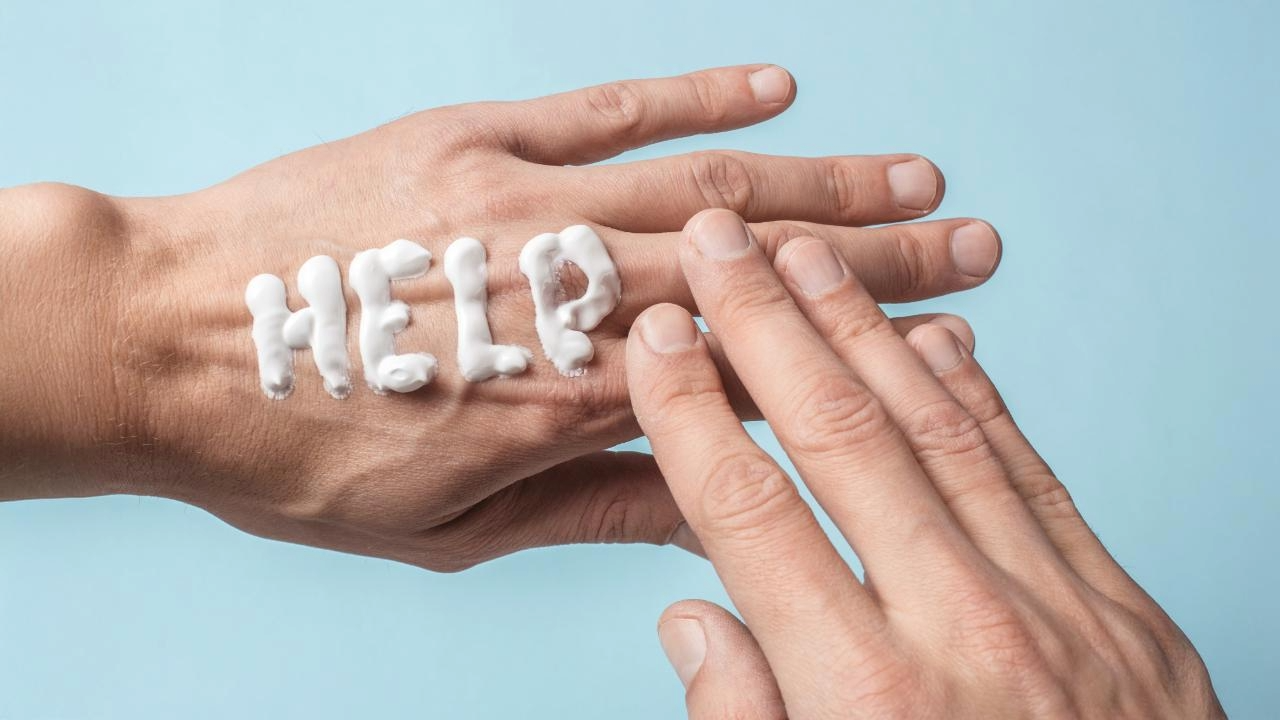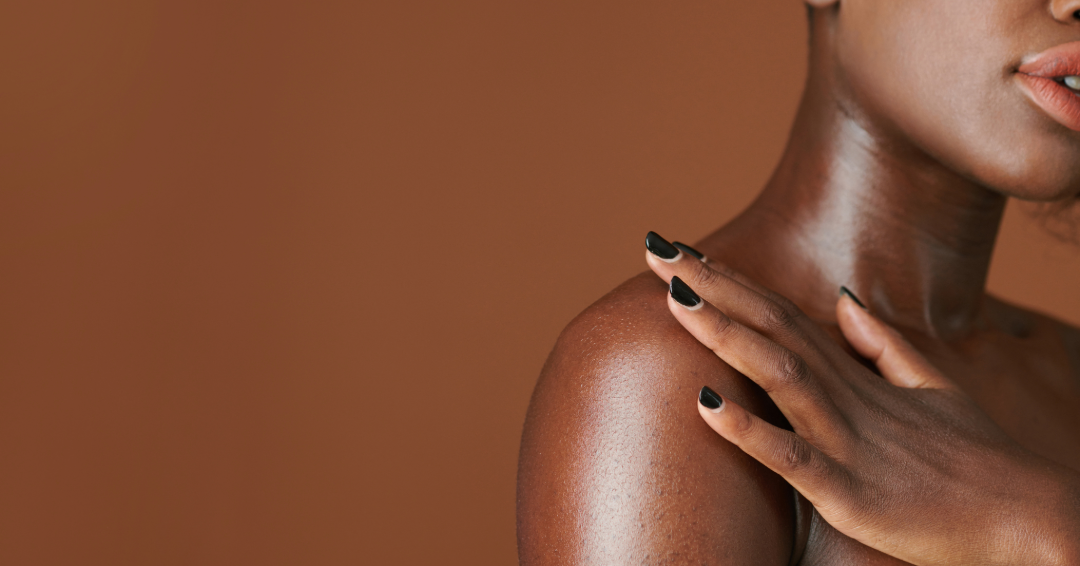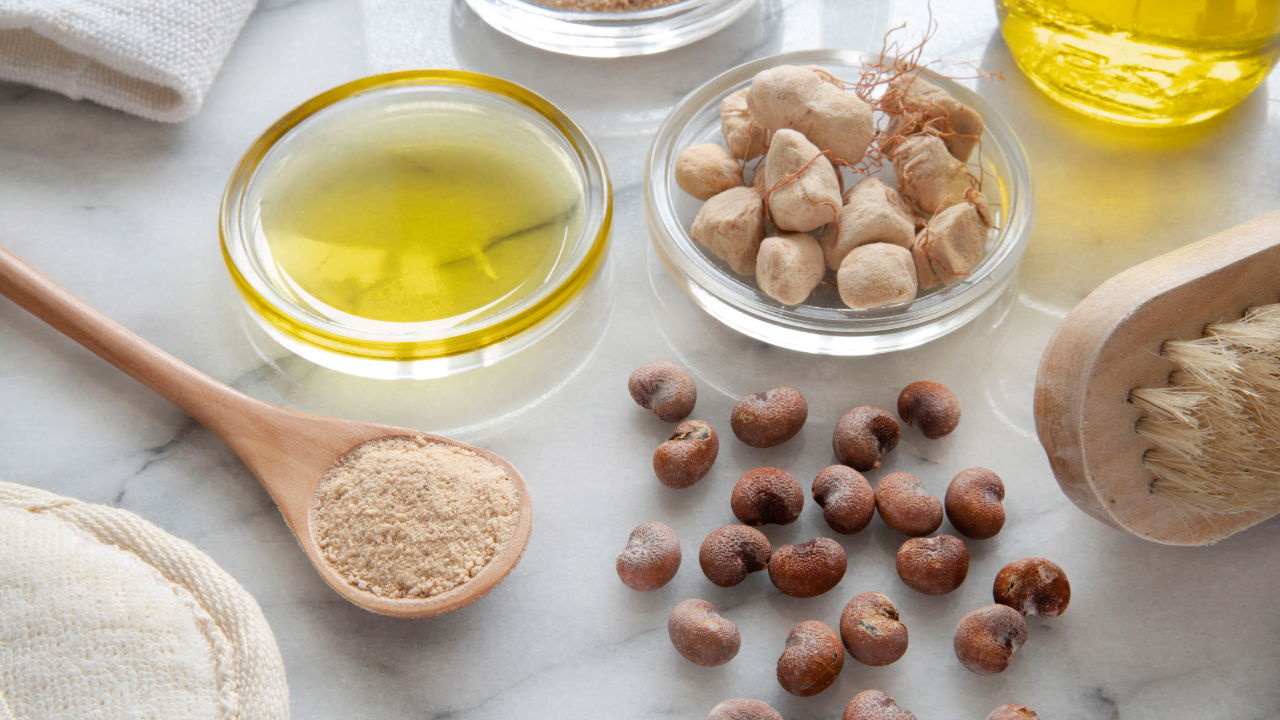What is African Black Soap?
Hey there, have you ever heard of African Black Soap or ABS? African Black Soap, is a traditional cleansing soap that has been used by west African cultures for centuries. African Black Soap is made from natural ingredients and is known for its cleansing and skin-nourishing properties.

In this blog post, we'll look at what African Black Soap is, how it's made, and what makes it authentic. We'll also explore the benefits of using African Black Soap, including how it can improve the appearance and health of your skin.
But first, let's delve into the history and origins of this beautiful soap. African Black Soap has a rich cultural heritage, and understanding its roots can give us a greater appreciation for its value and benefits.
How is African Black Soap made?
So, how is African Black Soap made? It's a simple process involving key ingredients and traditional production methods.

African Black Soap is made using all-natural ingredients such as plantain skins, cocoa pods, palm kernel oil, and shea butter. These ingredients are carefully sourced and blended to create the soap.
Next, traditional production methods turn the combined ingredients into a solid soap bar. The mixture is typically cooked over an open flame until it reaches a thick viscus consistency. Once this happen the soap is left to cool and harden into the final product.
It's worth noting that different types of African Black Soap are available on the market. Raw African Black Soap is the most traditional and is made using the above mentioned methods. Commercial African Black Soap, on the other hand, may contain additional ingredients or additives that alter the composition and properties of the black soap. Knowing the differences between raw and commercial African Black Soap is essential to get the most out of this wonderful soap.
What makes African Black Soap authentic?
Now that we know how African Black Soap is made, and what makes it authentic there are a few critical criteria to look out for when identifying authentic African Black Soap.

First, authentic African Black Soap should be made using all-natural ingredients and traditional production methods. This means the black soap should not contain synthetic additives, and the soap should be made using time-honored techniques.
Second, authentic Raw African Black Soap should have a distinct appearance and texture. It's typically dark in color, has an uneven surface, and may even have small bits of plantain skin or cocoa pod embedded in it. This is a result of the natural ingredients and production methods used in making the soap.
Finally, it's important to source Raw African Black Soap from reputable suppliers who work directly with cooperatives and communities in West Africa. This helps to ensure the ingredients are sustainably sourced and the communities involved in making the soap are fairly compensated for their work.
By following these criteria for what makes the black soap authentic and purchasing authentic African Black Soap, you can be sure that you're getting a high-quality, effective, and ethical product.
What are the main ingredients in African Black Soap?
African Black Soap can be made with various natural ingredients, including cocoa pods, palm leaves, coconut oil, and shea butter. However, one of the secret ingredients in traditional African Black Soap is plantain skins.
Plantain skins are rich in vitamins A and E, as well as iron and potassium, which can help to nourish and protect your skin. They also contain natural enzymes that can help exfoliate and remove dead skin cells, making your skin feel smooth and refreshed.
What does African Black Soap do?
So, what can African Black Soap do for your skin? It turns out quite a lot! African Black Soap is known for its many benefits and is a popular choice for people looking to improve the health and appearance of their skin.
African Black Soap is an excellent cleanser. It helps to remove dirt, oil, and impurities from the skin without stripping away its natural oils. This makes it a great choice for people with oily or acne-prone skin.
African Black Soap is also known for its moisturizing properties. Some black sop contains shea butter, palm kernel and other natural oils that help to nourish and hydrate the skin. This makes it a good choice for people with dry or sensitive skin.
In addition to its cleansing and moisturizing properties, African Black Soap is effective against various skin conditions. It's been shown to help alleviate symptoms associated with eczema, psoriasis, and other inflammatory skin conditions.
African Black Soap isn't just for the skin, though. Black soap can also be used on the hair and scalp to promote healthy hair growth and improve scalp health. It helps remove buildup and excess oil from the scalp, leading to healthier, more manageable hair.
Overall, African Black Soap is a versatile and practical product that can benefit your skin and hair. Whether you're looking to improve the appearance of your skin, alleviate a skin condition, or promote healthy hair growth, African Black Soap is worth a try.
Is it ok to use African Black Soap every day?
African Black Soap is safe to use daily, but it's important to listen to your skin and adjust your usage accordingly. Some people may find using African Black Soap daily too drying, while others may find it the perfect addition to their daily skincare routine.
If you're using African Black Soap for the first time, it's a good idea to use it every other day and gradually increase the frequency as your skin adjusts. Following up with a moisturizer after using African Black Soap is also important to help hydrate the skin.
Possible side effects of African Black Soap are generally mild and include dryness, irritation, and itching. If you experience any of these side effects, reducing your usage or stopping using African Black Soap altogether is a good idea. It's also important to avoid using African Black Soap on open wounds or broken skin.
Is African Black Soap good for your face?
African Black Soap can be a great addition to your facial skincare routine. It's known for its cleansing and moisturizing properties, which can help improve your skin's overall health and appearance.

To use African Black Soap on your face, wet your skin and lather a small amount of the soap in your hands. Gently massage the soap onto your face, taking care to avoid the delicate eye area. African Black Soap has a higher ph than most other soap and can sting your eyes if the soap gets in. Rinse thoroughly with water and pat your skin dry.
Following up with a moisturizer after using African Black Soap on your face is important, as it can be drying for some skin types. It's also a good idea to use African Black Soap as part of a complete skincare routine, including a cleanser, toner, and moisturizer, to help keep your skin healthy and hydrated.
Can Caucasian people use African Black Soap?
African Black Soap can be used by people of all skin types, including Caucasians. However, it's important to consider your skin's needs and adjust your usage accordingly.

If you have dry or sensitive skin, you may find that African Black Soap is too drying and irritating for your skin. In this case, it's best to use African Black Soap less frequently or to avoid using it altogether.
For non-African users, it's important to know that authentic African Black Soap may have a different texture and smell than what you're used to in traditional Western soaps. This is because African Black Soap is made with natural ingredients and doesn't contain artificial fragrances or additives.
How long does it take for African Black Soap to clear your skin?
The amount of time it takes to see results from using African Black Soap can vary depending on several factors, including the severity of your skin condition and how often you use it.
Generally, you can expect noticeable skin improvements within a few weeks of regular use. However, being patient and consistent with your usage is important, as it can take longer for some people to see results.
To get the most out of African Black Soap, it's important to use it as part of a complete skincare routine and to follow up with a moisturizer after using it. With regular use, African Black Soap can help improve your skin's overall health and appearance.
What are the side effects of African Black Soap?
While African Black Soap is generally safe and beneficial for most people, there are some possible side effects. Some people may experience skin irritation or dryness, especially if they have sensitive skin.
If you have sensitive skin, it's a good idea to patch-test African Black Soap on a small portion of your skin before using it all over your body. Additionally, it's important to avoid using African Black Soap on broken or irritated skin, as this can exacerbate any existing issues.
Does African Soap lighten skin?
There is a common misconception that African Black Soap can lighten skin, but this is a myth. African Black Soap does not contain any bleaching agents or harsh chemicals that can alter your skin's natural color.
African Black Soap can help to even out your skin tone and improve the appearance of dark spots or hyperpigmentation. However, it will not lighten your skin beyond its natural color.
It's important to remember that everyone's skin is different, and results can vary depending on many factors. If you're looking to improve the overall appearance of your skin, African Black Soap can be a great addition to your skincare routine, but it's important to approach it with realistic expectations.
Where to Find Authentic African Black Soap Brands
When shopping for African Black Soap, choosing a reputable brand that sources high-quality, authentic ingredients is important. Dudu Osun, Alaffia, and SheaMoisture are all well-known brands that work directly with women-owned cooperatives in West Africa to source their ingredients.
One brand that is worth highlighting is Merin Kind, which sources its shea butter and African Black Soap from women-owned cooperatives in Nigeria. Merin Kind is committed to promoting sustainability and empowering women in West Africa through its sourcing practices. By choosing Merin Kind, you can feel good about supporting a brand that is dedicated to ethical and sustainable sourcing.

Whether you choose Dudu Osun, Alaffia, SheaMoisture, or Merin Kind, you can feel confident that you're using an authentic African Black Soap product that is good for your skin and good for the communities that produce it.
Conclusion
In conclusion, African Black Soap is a natural, multipurpose product that has been used for centuries in West Africa for its numerous skin benefits. It is made with plant-based ingredients like plantain skins, cocoa pods, and shea butter, which make it gentle yet effective for all skin types.
African Black Soap is known for its ability to soothe and cleanse the skin, and it is effective in treating a range of skin conditions like acne, eczema, and psoriasis. It is also versatile enough to be used on the hair and scalp, making it an all-in-one solution for natural hair care.
When purchasing African Black Soap, it's important to choose an authentic, reputable brand that sources its ingredients ethically and sustainably. Brands like Merin Kind, Dudu Osun, Alaffia, and SheaMoisture are all excellent options that work with women-owned cooperatives in West Africa to source their ingredients.
Whether you want to improve your skin's overall health and appearance or treat specific skin conditions, African Black Soap is a natural and effective solution. By incorporating it into your skincare routine, you can enjoy its numerous benefits and feel good about supporting ethical and sustainable sourcing practices.



